-
 Bitcoin
Bitcoin $85,094.1996
3.00% -
 Ethereum
Ethereum $1,898.2510
3.90% -
 Tether USDt
Tether USDt $1.0000
-0.02% -
 XRP
XRP $2.1275
1.48% -
 BNB
BNB $609.5019
0.48% -
 Solana
Solana $126.3942
1.10% -
 USDC
USDC $1.0000
-0.01% -
 Dogecoin
Dogecoin $0.1731
3.32% -
 Cardano
Cardano $0.6748
1.52% -
 TRON
TRON $0.2378
-0.16% -
 Toncoin
Toncoin $4.0436
-1.44% -
 Chainlink
Chainlink $13.9516
2.73% -
 UNUS SED LEO
UNUS SED LEO $9.2107
0.78% -
 Stellar
Stellar $0.2703
1.97% -
 Avalanche
Avalanche $19.5777
3.84% -
 Sui
Sui $2.3968
5.07% -
 Shiba Inu
Shiba Inu $0.0...01258
0.64% -
 Hedera
Hedera $0.1695
3.31% -
 Polkadot
Polkadot $4.1448
2.55% -
 Litecoin
Litecoin $84.0181
0.81% -
 MANTRA
MANTRA $6.2885
0.30% -
 Bitcoin Cash
Bitcoin Cash $307.1942
1.05% -
 Bitget Token
Bitget Token $4.6637
3.11% -
 Dai
Dai $1.0000
0.01% -
 Ethena USDe
Ethena USDe $0.9998
0.00% -
 Pi
Pi $0.7075
-2.11% -
 Hyperliquid
Hyperliquid $13.1576
0.70% -
 Monero
Monero $216.5717
0.60% -
 Uniswap
Uniswap $6.2343
3.68% -
 Aptos
Aptos $5.3417
0.81%
What does blockchain mining mean? What are the legal risks of mining?
Blockchain mining verifies transactions and adds them to the blockchain, with miners earning cryptocurrency rewards, but it comes with legal risks like regulatory compliance and taxation.
Mar 31, 2025 at 05:07 pm
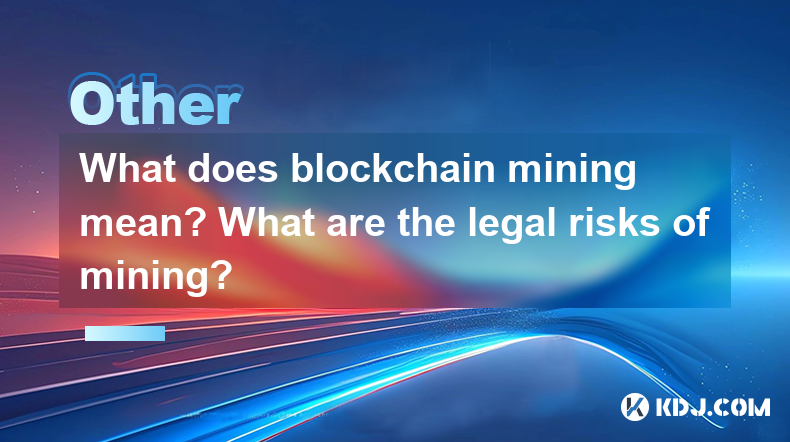
Blockchain mining is the process by which transactions are verified and added to the public ledger, known as the blockchain. Miners use powerful computers to solve complex mathematical problems, which, once solved, allow them to add a block of transactions to the blockchain. In return, miners are rewarded with cryptocurrency, typically Bitcoin. This process is crucial for maintaining the integrity and security of the blockchain network. Mining not only helps in transaction validation but also in creating new coins and ensuring the decentralized nature of cryptocurrencies.
The concept of mining originated with Bitcoin, created by Satoshi Nakamoto. The first successful miner to solve the puzzle gets to add a block to the blockchain and is rewarded with newly minted bitcoins. This reward system incentivizes miners to contribute their computational power to the network. Over time, as more miners join the network, the difficulty of the mathematical problems increases, ensuring that new blocks are added at a consistent rate, typically every 10 minutes for Bitcoin.
Types of Mining
There are several types of mining methods used in the cryptocurrency world. The most common include:
- Proof of Work (PoW): This is the original consensus algorithm used by Bitcoin. Miners compete to solve cryptographic puzzles, and the first to solve it gets to add a block to the blockchain.
- Proof of Stake (PoS): In PoS, miners are chosen to create new blocks based on the number of coins they hold and are willing to "stake" as collateral. This method is less energy-intensive than PoW.
- Cloud Mining: Miners rent computational power from a data center to mine cryptocurrencies without having to manage the hardware themselves.
- Pool Mining: Miners join forces in a pool to combine their computational resources, increasing their chances of solving the puzzle and earning rewards, which are then distributed among pool members.
Each method has its own set of advantages and challenges, influencing the choice of mining strategy based on factors like cost, energy consumption, and potential returns.
The Role of Miners in the Blockchain Ecosystem
Miners play a pivotal role in the blockchain ecosystem. They not only validate transactions but also secure the network against fraudulent activities. By solving complex puzzles, miners ensure that no one can double-spend their coins or alter the transaction history. This security comes from the decentralized nature of mining, where no single entity can control the majority of the network's computational power.
Miners also contribute to the creation of new coins. In the case of Bitcoin, the reward for mining a block halves approximately every four years, a process known as halving. This mechanism is designed to control the supply of bitcoins, making it a deflationary currency. Miners are thus integral to the economic model of cryptocurrencies, balancing the supply and demand dynamics.
Legal Risks of Mining
Mining cryptocurrencies can come with several legal risks that miners should be aware of. These risks can vary significantly depending on the jurisdiction and the specific regulations in place.
- Regulatory Compliance: Different countries have different regulations regarding cryptocurrencies. Some nations have strict laws that require miners to register and comply with anti-money laundering (AML) and know-your-customer (KYC) regulations. Failure to comply can result in hefty fines or even criminal charges.
- Energy Consumption: Mining is an energy-intensive process, and some regions have imposed restrictions or additional taxes on high-energy consumption activities. Miners need to be aware of local energy regulations and potential environmental impact fees.
- Taxation: The tax treatment of mined cryptocurrencies can be complex. In some jurisdictions, mined coins are considered taxable income at the time of mining, while in others, they may be taxed upon sale or exchange. Miners must keep detailed records and understand their tax obligations to avoid legal issues.
- Ownership and Property Rights: The legal status of cryptocurrencies can be unclear in some countries, leading to disputes over ownership and property rights. Miners should be aware of the legal framework in their jurisdiction to protect their assets.
Mitigating Legal Risks
To mitigate the legal risks associated with mining, miners can take several steps:
- Stay Informed: Regularly check for updates on cryptocurrency regulations in your jurisdiction. Joining industry associations or forums can provide valuable insights and updates.
- Consult Legal Experts: Engage with lawyers who specialize in cryptocurrency and blockchain technology to ensure compliance with all relevant laws and regulations.
- Maintain Detailed Records: Keep thorough records of all mining activities, including energy consumption, income from mined coins, and any transactions involving cryptocurrencies. This can be crucial for tax purposes and in case of legal disputes.
- Consider Location: Some regions are more crypto-friendly than others. Miners might consider relocating to jurisdictions with favorable regulations and lower energy costs.
The Future of Mining
The future of mining is likely to see significant changes as the industry evolves. With the increasing focus on sustainability, there is a push towards more energy-efficient mining methods. Proof of Stake and other consensus mechanisms are gaining popularity as alternatives to the energy-intensive Proof of Work.
Technological advancements are also expected to play a crucial role. The development of more efficient mining hardware and software could lower the barriers to entry, making mining more accessible to a broader audience. Additionally, the rise of decentralized finance (DeFi) and other blockchain applications may create new opportunities for miners to contribute to and benefit from these ecosystems.
Common Questions Related to Blockchain Mining and Legal Risks
Q: What is blockchain mining?
A: Blockchain mining is the process of verifying and adding transactions to the blockchain. Miners use powerful computers to solve complex mathematical problems, and upon solving them, they can add a block of transactions to the blockchain and are rewarded with cryptocurrency.
Q: How does Proof of Work (PoW) mining work?
A: In Proof of Work mining, miners compete to solve cryptographic puzzles. The first miner to solve the puzzle gets to add a block to the blockchain and is rewarded with newly minted cryptocurrency. This method is energy-intensive but ensures the security and decentralization of the network.
Q: What is Proof of Stake (PoS) mining?
A: Proof of Stake mining selects miners to create new blocks based on the number of coins they hold and are willing to "stake" as collateral. This method is less energy-intensive than PoW and is gaining popularity as a more sustainable alternative.
Q: What are the legal risks associated with mining cryptocurrencies?
A: Legal risks include regulatory compliance, energy consumption regulations, taxation complexities, and unclear ownership and property rights. Miners must be aware of and comply with local laws to avoid legal issues.
Q: How can miners mitigate legal risks?
A: Miners can mitigate legal risks by staying informed about regulations, consulting with legal experts, maintaining detailed records, and considering relocating to crypto-friendly jurisdictions.
Q: What is the future of blockchain mining?
A: The future of mining may see a shift towards more energy-efficient methods like Proof of Stake, along with technological advancements in mining hardware and software. The rise of DeFi and other blockchain applications could also create new opportunities for miners.
Disclaimer:info@kdj.com
The information provided is not trading advice. kdj.com does not assume any responsibility for any investments made based on the information provided in this article. Cryptocurrencies are highly volatile and it is highly recommended that you invest with caution after thorough research!
If you believe that the content used on this website infringes your copyright, please contact us immediately (info@kdj.com) and we will delete it promptly.
- Bitcoin May Be a Useful Hedge Against Inflation in the Near Future as Market Uncertainty Is Growing
- 2025-04-02 08:25:12
- Zcash Rises 11%, Monero Remains Stable—BlockDAG's Beta Testnet Spreads Like Wildfire, Hitting 110K Wallets
- 2025-04-02 08:25:12
- With the crypto market gaining momentum, a fresh wave of altcoins is capturing the attention of traders, analysts, and crypto enthusiasts
- 2025-04-02 08:20:14
- Robust Volatility Continues to Take Over the Broader Crypto Market
- 2025-04-02 08:20:14
- The crypto universe has undergone a financial earthquake
- 2025-04-02 08:15:12
- The first-ever meme coin index, Meme Index ($MEMEX), concluded its presale on Monday
- 2025-04-02 08:15:12
Related knowledge

What does blockchain mining mean? What are the legal risks of mining?
Mar 31,2025 at 05:07pm
Blockchain mining is the process by which transactions are verified and added to the public ledger, known as the blockchain. Miners use powerful computers to solve complex mathematical problems, which, once solved, allow them to add a block of transactions to the blockchain. In return, miners are rewarded with cryptocurrency, typically Bitcoin. This pro...
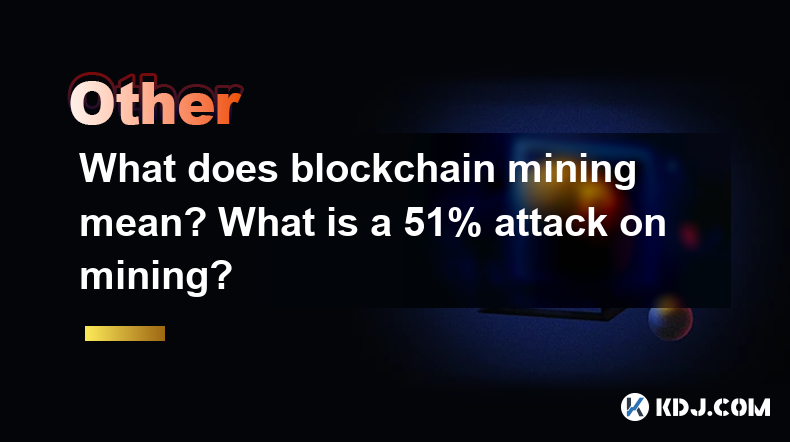
What does blockchain mining mean? What is a 51% attack on mining?
Apr 02,2025 at 03:28am
Blockchain mining is a critical process in the world of cryptocurrencies, particularly those that use proof-of-work (PoW) consensus mechanisms like Bitcoin. Mining involves using computational power to solve complex mathematical puzzles, which, when solved, validate and add new transactions to the blockchain. Miners are incentivized to participate throu...
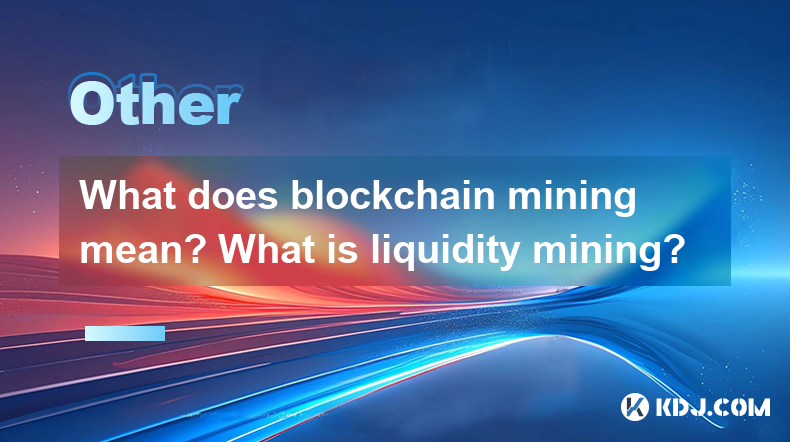
What does blockchain mining mean? What is liquidity mining?
Apr 01,2025 at 12:07am
What is Blockchain Mining?Blockchain mining is a critical process in the world of cryptocurrencies, particularly for networks like Bitcoin and Ethereum. It involves the use of computational power to solve complex mathematical problems, which in turn validates transactions and adds them to the blockchain. Miners are incentivized through rewards, typicall...
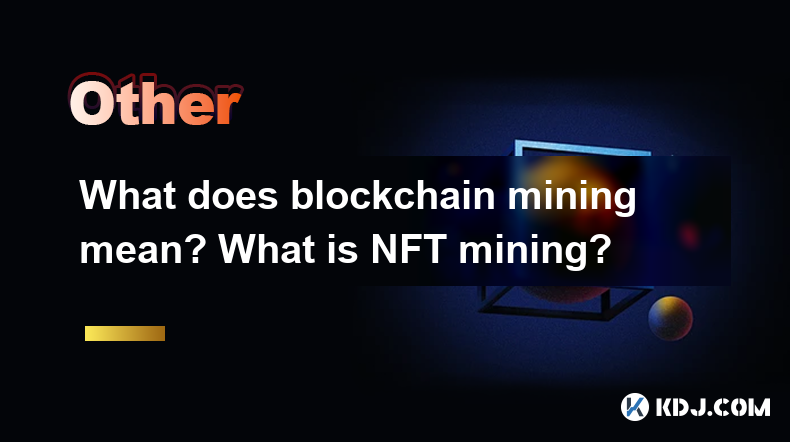
What does blockchain mining mean? What is NFT mining?
Mar 31,2025 at 04:07pm
Blockchain mining is a crucial process in the world of cryptocurrencies, particularly for networks like Bitcoin and Ethereum. It involves verifying transactions and adding them to the blockchain, a decentralized ledger. Miners use powerful computers to solve complex mathematical problems, which, when solved, allow them to add a block of transactions to ...
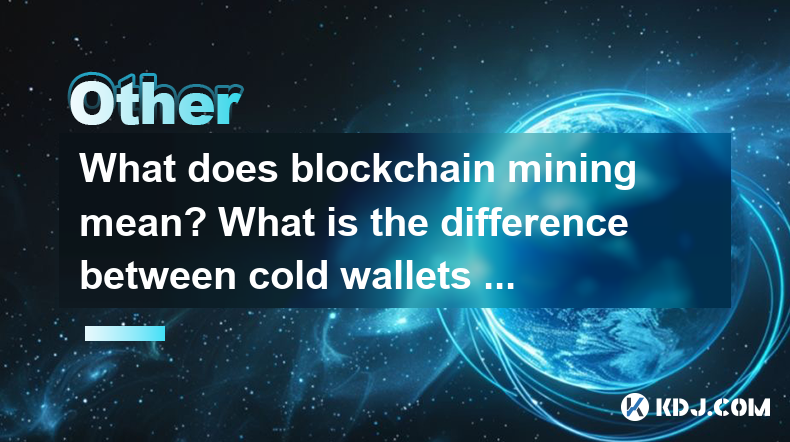
What does blockchain mining mean? What is the difference between cold wallets and hot wallets for mining?
Apr 01,2025 at 07:56am
Blockchain mining is a critical process in the world of cryptocurrencies. It involves verifying transactions and adding them to the blockchain, a decentralized ledger. Miners use powerful computers to solve complex mathematical problems, which, when solved, allow them to add a block of transactions to the blockchain. In return, miners are rewarded with ...
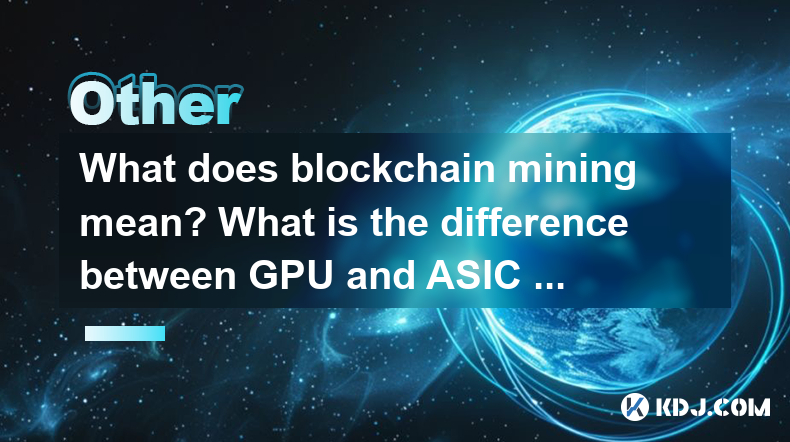
What does blockchain mining mean? What is the difference between GPU and ASIC mining?
Apr 01,2025 at 11:56am
Blockchain mining is a crucial process in the world of cryptocurrencies, particularly for networks like Bitcoin and Ethereum. At its core, mining involves solving complex mathematical problems to validate transactions and add them to the blockchain, a decentralized ledger. Miners compete to solve these problems, and the first to succeed is rewarded with...

What does blockchain mining mean? What are the legal risks of mining?
Mar 31,2025 at 05:07pm
Blockchain mining is the process by which transactions are verified and added to the public ledger, known as the blockchain. Miners use powerful computers to solve complex mathematical problems, which, once solved, allow them to add a block of transactions to the blockchain. In return, miners are rewarded with cryptocurrency, typically Bitcoin. This pro...

What does blockchain mining mean? What is a 51% attack on mining?
Apr 02,2025 at 03:28am
Blockchain mining is a critical process in the world of cryptocurrencies, particularly those that use proof-of-work (PoW) consensus mechanisms like Bitcoin. Mining involves using computational power to solve complex mathematical puzzles, which, when solved, validate and add new transactions to the blockchain. Miners are incentivized to participate throu...

What does blockchain mining mean? What is liquidity mining?
Apr 01,2025 at 12:07am
What is Blockchain Mining?Blockchain mining is a critical process in the world of cryptocurrencies, particularly for networks like Bitcoin and Ethereum. It involves the use of computational power to solve complex mathematical problems, which in turn validates transactions and adds them to the blockchain. Miners are incentivized through rewards, typicall...

What does blockchain mining mean? What is NFT mining?
Mar 31,2025 at 04:07pm
Blockchain mining is a crucial process in the world of cryptocurrencies, particularly for networks like Bitcoin and Ethereum. It involves verifying transactions and adding them to the blockchain, a decentralized ledger. Miners use powerful computers to solve complex mathematical problems, which, when solved, allow them to add a block of transactions to ...

What does blockchain mining mean? What is the difference between cold wallets and hot wallets for mining?
Apr 01,2025 at 07:56am
Blockchain mining is a critical process in the world of cryptocurrencies. It involves verifying transactions and adding them to the blockchain, a decentralized ledger. Miners use powerful computers to solve complex mathematical problems, which, when solved, allow them to add a block of transactions to the blockchain. In return, miners are rewarded with ...

What does blockchain mining mean? What is the difference between GPU and ASIC mining?
Apr 01,2025 at 11:56am
Blockchain mining is a crucial process in the world of cryptocurrencies, particularly for networks like Bitcoin and Ethereum. At its core, mining involves solving complex mathematical problems to validate transactions and add them to the blockchain, a decentralized ledger. Miners compete to solve these problems, and the first to succeed is rewarded with...
See all articles























































































